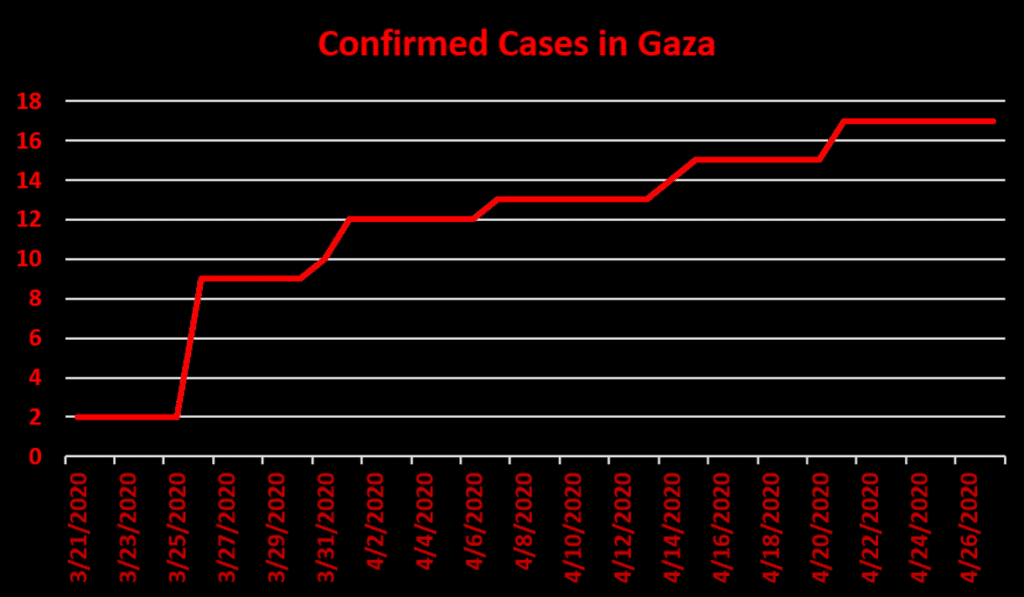April 27, 2020 | Policy Brief
Gaza’s Militant Groups Battle COVID-19
April 27, 2020 | Policy Brief
Gaza’s Militant Groups Battle COVID-19
With local authorities in Gaza woefully unprepared to deal with the COVID-19 crisis, Hamas has turned to its familiar strategy of leveraging violence and international pressure to extort Israel into providing assistance.
Situation Overview
Although Israel is suffering from a severe epidemic, the outbreak in Gaza, one of the most densely populated territories in the world, has so far been mild. The enclave recorded its first confirmed case on March 21. As of April 27, Gaza had reported just 17 confirmed cases, with eight recoveries and no deaths.
Still, the possibility of a major epidemic in Gaza is a significant concern. Hamas and other Gaza-based militant groups have thus launched public health efforts to contain the crisis, along with a simultaneous public relations campaigns to boost their appeal among Gaza’s residents.
In mid-March, Hamas’ al-Qassam Brigades, the terror group’s fighting force, began constructing two quarantine centers in the Gaza Strip, each capable of holding approximately 500 patients. Hamas produced images and videos of the construction process, prominently displaying the al-Qassam Brigades flag atop Hamas construction vehicles. Meanwhile, Hamas-controlled ministries have distributed thousands of meals to Palestinians under quarantine.
Also wielding public health efforts to improve its standing in the Gaza Strip was the Mujahideen Brigades, the armed wing of Palestinian Mujahideen Movement, a small but active militant group dedicated to war with Israel. The group published photos and videos showing its operatives disinfecting stores, mosques, and other civilian buildings. A banner produced by the militant group equates the fight against COVID-19 with jihad.
For its part, the Fatah-linked Abd al Qadir al Husseini Brigades conducted its own disinfection campaign in the Gaza town of Rafah. The group deployed a large truck carrying disinfectant material, adorned with a Brigades banner declaring the group’s readiness to fight COVID-19.
COVID-19 in the Greater Middle East
| Country | Cases | Deaths |
| Turkey | 112,261 | 2,900 |
| Iran | 91,472 | 5,806 |
| Saudi Arabia | 18,811 | 144 |
| Israel | 15,555 | 204 |
| Pakistan | 13,915 | 292 |
| Qatar | 11,244 | 10 |
| UAE | 10,839 | 82 |
| Egypt | 4,782 | 337 |
| Morocco | 4,120 | 162 |
| Algeria | 3,517 | 432 |
| Kuwait | 3,288 | 22 |
| Bahrain | 2,723 | 8 |
| Oman | 2,049 | 10 |
| Iraq | 1,847 | 88 |
| Afghanistan | 1,703 | 57 |
| Tunisia | 949 | 38 |
| Lebanon | 710 | 24 |
| Somalia | 480 | 26 |
| Jordan | 450 | 7 |
| W. Bank & Gaza | 342 | 2 |
| Sudan | 275 | 22 |
| Libya | 61 | 2 |
| Syria | 43 | 3 |
| Yemen | 1 | 0 |
Source: JHU Coronavirus Resource Center
Data current as of 5:30 PM, April 27, 2020.
Implications
Even before COVID-19, Gaza’s healthcare system had fallen into utter disrepair. The Hamas government had diverted resources from public health to its never-ending war with Israel. But even if these resources were appropriately allocated, it is unclear whether the terror group has the skills necessary to coordinate an effective response to the virus. Thus, Hamas and its allies will continue to tout their efforts to fight the virus, but will also lean heavily on outside assistance.
Among the external assistance it solicits, Hamas has little choice but to ask for help from Israel. There are some signs of this already. For weeks, Hamas and Israel have been conducting back-channel negotiations, with Israel pressing Hamas to release the remains of two fallen Israeli soldiers and two Israeli civilian hostages in Gaza. In exchange, Jerusalem is offering to release Palestinian prisoners and increase medical assistance. Yahya Sinwar, Hamas’ leader in Gaza, publicly declared Hamas’ willingness to make “partial concessions” on the prisoners issue if Israel meets its conditions.
This progress should not be viewed as a warming of ties, however. Hamas is threatening to attack Israel if it does not meet the group’s demands. Sinwar recently threatened, “If ventilators are not brought into [Gaza], we’ll take them by force from Israel and stop the breathing of 6 million Israelis.” The group also continues to launch rockets into the Mediterranean Sea to test range and accuracy, in preparation for a future war with Israel. Rockets from the Hamas-controlled Gaza Strip landed in Israel on March 27, resulting in a retaliatory Israeli strike on Hamas positions.
What to Watch for
With only 17 confirmed cases, Gaza’s COVID-19 outbreak may still be containable. If the virus spreads, it could place enormous pressure on Hamas to cooperate with Israel to care for Gaza’s population. A pandemic in Gaza could also put pressure on Israel to provide more assistance. But such cooperation will not be possible if Hamas continues to threaten violence and war.
Joe Truzman is an analyst and contributor at the Long War Journal (LWJ), a project of the Foundation for Defense of Democracies (FDD), where David May is a research analyst and contributor to FDD’s Center on Military and Political Power (CMPP). For more analysis from Joe, David, LWJ, and CMPP, please subscribe HERE. Follow Joe and David on Twitter @Jtruzmah and @DavidSamuelMay. Follow FDD on Twitter @FDD and @FDD_CMPP and @LongWarJournal. FDD is a Washington, DC-based, nonpartisan research institute focusing on national security and foreign policy.
